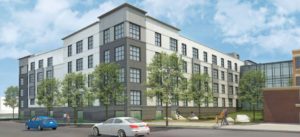The National Grid labor dispute is drawing to a close, but the effects on real estate development in 85 Greater Boston communities are expected to linger throughout the year as projects that already have been delayed for months wait for hookups.
Large commercial developments are expected to face the biggest delays, said Tamara Small, CEO of NAIOP-Massachusetts. New state safety regulations enacted in December are expected to further complicate the process of connecting housing and businesses to the network starting in April. And winter bans on street openings in most communities narrow the window in which work can be completed, prompting calls for a one-time exception.
“This has had a significant impact on office, lab, retail, institutional projects: you name it,” Small said. “I hope we’re on a priority list, but we don’t have insight into how those are established.”
Real estate developers and industry groups say they’ve received little guidance from the British utility since Jan. 7, when more than 1,000 unionized employees approved a new contract that ends the six-month work stoppage.
The dispute has affected hundreds of projects and forced developers to come up with workarounds, such as installing temporary propane tanks for heating and diesel generators to prevent winter damage to semi-completed buildings. Others have delayed groundbreaking on approved projects, amid uncertainty whether they’ll be able to complete them and pay off construction loans on schedule.
‘It’s Going to Cascade’
In Charlestown’s Sullivan Square, the conversion of an industrial property into 171 apartments was originally scheduled for completion in December. But it’s unlikely to welcome move-ins before March under the most optimistic scenario, according to Boston-based developer Berkeley Investments.
Financed with a $43 million construction loan from Washington Trust Co., the project includes new construction of a 4-story building and redevelopment of the former Graphic Arts Finishers building at 32 Cambridge St. as loft-style apartments. The buildings have electric heating and gas-fired hot water heaters.
Preliminary natural gas work began in March 2018, but the final connection was delayed while National Grid crews installed a new street main serving the Encore Boston Harbor casino, said Paul Goodwin, a development project manager for Berkeley Investments. Then the lockout hit in June.
The project design team considered alternatives, including installing temporary propane tanks, but shelved the idea because of insufficient room on the 1.6-acre site, Goodwin said. And installing electric heat would have jeopardized the property’s energy code compliance. About eight weeks of construction remains to be completed following the gas hookups.

32 Cambridge St., Charlestown
“This backlog is going to be a challenge for them and it’s going to cascade,” Goodwin said. “How are they keeping up with new product?”
A five-unit condo project at 145 Stoughton St. in Dorchester is a similar victim of bad timing. Developer Denis Keohane applied for the gas hookup in May and completed the rest of the construction in October but can’t sell the units without an occupancy permit. In the meantime, Keohane is responsible for a $14,700 monthly payment on the $2.3 million construction loan, although he has been able to keep current on his payments so far.
“When you do your budget, you always put in a reserve to carry a few months, but you don’t expect to carry eight months,” he said.
Keohane has postponed groundbreaking of an eight-unit condo project in Dorchester and an eight-home subdivision in Hyde Park because of the uncertainty.
DPU Delays New Safety Regulations
Along with the six-month backlog, connections could be further delayed by new safety regulations enacted in the wake of September’s Merrimack Valley gas disaster and an October overpressurization incident in Woburn. Gov. Charlie Baker on Dec. 31 signed a law requiring a certified engineer approve all natural gas work that could pose a public safety risk.
Although the law was expected to take effect immediately, the DPU issued new guidance to National Grid on Jan. 4 that the requirement won’t take effect until April 1, National Grid spokeswoman Christine Milligan said.
After workers begin returning to work the week of Jan. 21, National Grid’s first priority will be emergency work for the first few weeks, Milligan said.
“We’re working to prioritize new gas services based on greatest need and as long as the weather continues to be favorable and provided the company can get the necessary permits from cities and towns, we should have the capacity to resume a more normal level of non-emergency work in early February,” Milligan wrote in an email.

Steve Adams
Many communities ban street openings for non-emergency utility work from Nov. 15 until April 15. NAIOP’s Small said the organization is asking communities to lift the bans unless there’s inclement weather.
In Boston, contractors also can apply for a waiver from the public works department if they demonstrate a hardship. In response to an inquiry from Banker & Tradesman, the mayor’s office referred to the existing regulations.
As far as prioritizing new hookups, National Grid said connections will be scheduled on a case-by-case basis after considering such factors as location, work requirements and need, Milligan said.
“It’s the permits and weather that will be the primary drivers for timing over the next few months,” she said.




 |
| 
